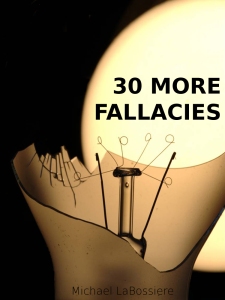Proving X, Concluding Y
Description:
This fallacy occurs when a conclusion is drawn from evidence that does not support that conclusion but another claim. The form of this reasoning is as follows:
- Evidence for claim X is presented.
- Conclusion: Y
While all fallacies are such that the alleged evidence provided in the premise(s) fails to adequately support the conclusion, what distinguishes this fallacy is that the evidence presented actually does provide support for a claim. However, it does not support the conclusion that is actually presented.
This fallacy typically occurs when the evidence for X seems connected or relevant to Y in a logical way, but actually is not. It is this seeming relevance or connection that lures the victim into accepting the conclusion. As such, this differs from fallacies in which the victim is lured to the conclusion by an emotional appeal.
Obviously, this fallacy (like all fallacies) is a case of non-sequiter (“does not follow”) in which the conclusion does not logically follow from the premises. However, this specific sort of mistake is common and interesting enough to justify giving it its own name and entry.
Example #1
“I am troubled by the reports of binge drinking by college students. According to the statistics I have seen, about 19% of college students are binge drinkers and this leads to problems ranging from poor academic performance to unplanned pregnancies. Since people often drink in response to pressure, this shows that professors are putting their students under too much pressure and hence need to make their classes easier.”
Example #2
“Our product testing revealed that 60% of the people on Acme Diet Master reported that they felt less hungry when using the product. This shows that 60% ate less when using our product. I think we have our next big product!”
42 Fallacies for Free

- Image via Wikipedia
If you Google “fallacy” you will find a link to my work on the first page. I used to be the top link, but Wikipedia beat me. Because of this, I receive a fair amount of email from people asking about fallacies and about getting a copy of the material. I finally got around to updating the material and assembling it into a fairly nice PDF file, complete with a color cover. You can view/download it here: 42 Fallacies.
The book contains the following fallacies:
Ad Hominem
Ad Hominem Tu Quoque
Appeal to the Consequences of a Belief
Appeal to Authority
Appeal to Belief
Appeal to Common Practice
Appeal to Emotion
Appeal to Popularity
Appeal to Fear
Appeal to Flattery
Appeal to Novelty
Appeal to Pity
Appeal to Popularity
Appeal to Ridicule
Appeal to Spite
Appeal to Tradition
Begging the Question
Biased Generalization
Burden of Proof
Circumstantial Ad Hominem
Fallacy of Composition
Confusing Cause and Effect
Fallacy of Division
False Dilemma
Gambler’s Fallacy
Genetic Fallacy
Guilt by Association
Hasty Generalization
Ignoring a Common Cause
Middle Ground
Misleading Vividness
Peer Pressure
Personal Attack
Poisoning the Well
Post Hoc
Questionable Cause
Red Herring
Relativist Fallacy
Slippery Slope
Special Pleading
Spotlight
Straw Man
Two Wrongs Make a Right
Who is to Say?
Begs the Question
Being a philosophy professor, I find it vaguely annoying when people write or say things like “Referendum begs the question of our future in EU” or “Rolex ad on Newsweek site begs the question how big is too big.”
When people use “begs the question” in this manner, they actually mean “asks the question” or “raises the question.”However, the term “beg the question” already has an established usage as the name of a logical fallacy.
To beg the question is a logical fallacy that involves assuming what is to be proven. For example, if someone says “cheating on a test is wrong because it is wrongfully taking a test”, then he is begging the question. In effect, the person is saying “the reason cheating on a test is wrong is because it is wrong.”
One might wonder why this should be regarded as a problem. After all, it might be argued, people ought to be able to use words anyway they wish. If people use “beg the question” to mean “raises the question” then so be it.
While it is true that the meaning of terms is largely a matter of convention, it seems to make little sense to use “begs the question” to mean “asks the question.” After all, there are already perfectly good phrases to say “asks the question”, “raises the question” and so on. There thus seems to be little need to steal “begs the question.”
Another problem is that the increasingly popular usage of the phrase creates some confusion. For example, when I teach about fallacies I have to explain that to beg the question is a fallacy and that when someone says “begs the question” they might mean “asks the question.” Obviously, this is not a big deal. But, teaching logic is challenging enough without having to sort out such confusions.




![Reblog this post [with Zemanta]](https://i0.wp.com/img.zemanta.com/reblog_e.png)
leave a comment